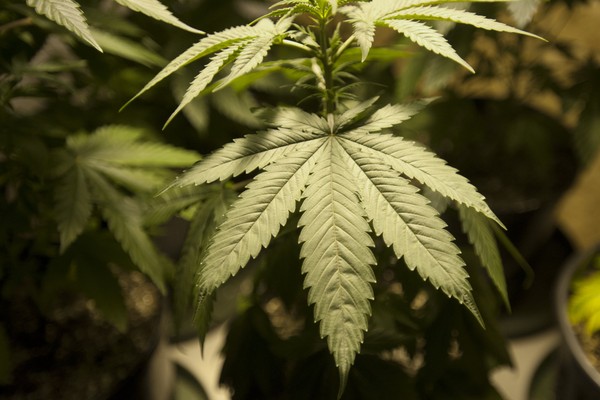EGELSTON TOWNSHIP, MI – Greg Maki kept his comments short and sweet when he supported the creation of a new medical marijuana ordinance that would allow growers and provisioning centers to operate in Egelston Township.
“All I have to say is, it’s just weed,” said Maki, 28, of Muskegon, during a public hearing before the township’s planning commission earlier this week.
Maki’s sentiment was echoed by other pro-pot advocates and would-be marijuana growers who dominated the public hearing.
Following the hearing and subsequent debate Tuesday, the planning commission on a 3-2 vote approved the ordinance and forwarded it to the Egelston Township Board of Trustees for consideration.
If the ordinance is approved by the township board, medical marijuana plants and products could be grown, manufactured and sold at provisioning centers located in Egelston Township. It’s not yet known when the board will vote, according to township Supervisor John Holter.
The township board voted unanimously in July to begin drafting an ordinance allowing the township to regulate the growth and sale of medical marijuana.
Michigan’s Licensing and Regulatory Affairs department issued a new set of rules earlier this year that allow municipalities to regulate medical marijuana on their own terms.
The proposed ordinance allows processing facilities in I-1 and I-2 industrial zones, provisioning centers in C-1 and C-2 commercial zones and growers in R-5 residential districts or I-1 and I-2 zones. Facilities must not be located less than 1,000 feet from a school, church or licensed day care facility.
The ordinance would also regulate how medical marijuana is distributed to Egelston Township patients and would discourage unregulated sales.
Voting in favor of the proposed Egelston Township ordinance were planning commission Vice Chairwoman Lois Gunther, Commissioner Robert Coon and Secretary Shawn Vanderstelt. Chairman Rob Gustafson and Commissioner Barbara Woudwyk voted “no.”
Here’s what each camp said during the Tuesday’s hearing.
Pro-medical marijuana crowd touts revenue, regulation
Among the most vocal supporters of the Egelston Township ordinance were growers and their business partners.
Jesse Sproat of Jension said he and his wife were small-scale caregivers looking to set up a larger operation in Muskegon County.
“She’s a doctor and I own three small businesses, so it made sense for us to stay here,” Sproat said. “People have their reservations, but there is a lot of medicinal benefit for it.
“That’s kind of why I got into this in the first place. All of my patients are my family members.”
With an ordinance in place, Sproat believes he can expand his operation while also giving back to Egelston by “being a good neighbor.”
Jason Skotarczak from Clean Green Farm said his main goal was to help people find “good medicine.” Skotarczak said many provisioning centers around the country were notorious for selling products with unregulated dosages, a practice he believes he can prevent for patients in Egelston Township.
“There’s a lot of bad medicine out there and what people are smoking is actually harming them,” he said. “We want to grow all organic and vegan. This will be a big process, but we’re very excited for the opportunity to build, to expand and to succeed.
“We feel good about Egelston Township and we’d like to be in this area.”
Both Sproat and Skotarczak are represented by Connie Maxim-Sparrow, the owner of Sparrow Consulting. Sparrow spoke of the economic benefits to the township.
She said two provisioning centers with a 3 percent state excise tax on retail sales of medical marijuana would amount to $817,640 in tax revenue a year.
All medical marijuana products sold would be subject to the state’s 6 percent sales tax. The tax on sales from two provisioning centers would send more than $1.6 million to the School Aid Fund and allocate $534,780 for local revenue sharing, Sparrow estimated.
Two provisioning centers run by her clients would create 50 new jobs with an economic impact of $2.7 million annually, she added.
Longtime Egelston Township resident Mary Jones said the medical marijuana ordinance would provide an economic boost to the township.
“Please do not be afraid to be the leader on this issue just because other communities are afraid to go forward,” Jones said. “Test this issue in your hearts and your minds, let the good outweigh the bad to encourage businesses to come to our community.
“I know and you know that Muskegon took away some of the tax base. It’s time for us to get something back.”
Residents concerned about zoning, ‘getting high’
Speaking against the ordinance was Charles Asplund, a retired doctor who said there was no medical benefit to the plant. He also said doctors have good success prescribing synthetic forms of THC, the psychoactive chemical in marijuana.
His medical opinion was bolstered by what he called his personal experience with the perceived dangers of marijuana: a few decades ago, Asplund’s daughter was injured in a car crash, and the driver, he claimed, was “high on marijuana.”
Asplund pleaded with planning commissioners to not let dollar signs cloud their judgment on what could be harmful unintended consequences.
“Ask yourself, ‘is marijuana going to make things better in our community?'” he said. “Is this something we want to be known for? I wonder about that. The purposed of the government is to protect life and property.
“Is that protecting life and property?”
Another resident, Janet Brott, said she agreed with Asplund.
“We do not know what the long-term consequences are going to be,” Brott said. “I do understand some of the good medical benefits, but my concern is that it does not belong in an R-5 district, and does not belong in a residential area. It should stay in an industiral district.”
credit:mlive.com

